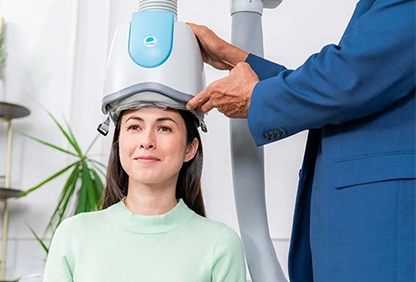Breaking the Silence: Confronting Mental Health Challenges in the UAE

A Growing Concern
Movement disorders, such as Parkinson’s disease, dystonia, and essential tremor, are neurological conditions that disrupt the ability to control body movements. They profoundly affect independence, emotional well-being, and the quality of life for patients and their families.
In the UAE, these disorders are becoming a significant healthcare challenge due to factors like an aging population, lifestyle changes, and limited access to specialized care.
The Unseen Epidemic: Mental Health Suffering Across the UAE
|
High Prevalence of Mental Health Disorders A 2020 study revealed that 57% of the UAE population suffered from at least one mental health disorder, highlighting the widespread nature of the issue. |
Dominance of Anxiety and Depression Among these, anxiety (56.4%) and depression (31.5%) were the most prevalent, indicating a significant burden of mood and anxiety-related conditions. |
|
Shortage of Mental Health Professionals In 2017, the UAE had only 1.65 psychiatrists per 100,000 population, a stark contrast to countries like the USA (16.6 per 100,000 in 2020), limiting access to specialized care. While this number has increased to 5.32 psychiatrists per 100,000 in 2022, the need still outweighs the availability. |
Limited Psychiatric Beds The WHO Mental Health ATLAS highlighted a severe shortage with only 0.9 hospital beds per 100,000 people in the UAE, far below the recommended levels. |
|
Impact of COVID-19 Studies during the pandemic revealed that over a third of the population felt their mental health had deteriorated, exacerbating existing vulnerabilities. |
Suicide Mortality Rate The suicide mortality rate in the UAE stood at 6.4 per 100,000 in 2019, underscoring the critical need for improved mental health support and intervention. |
|
High Therapy Costs The UAE has been noted as having the second most expensive therapy sessions globally, creating a significant financial barrier to accessing mental healthcare for many residents, especially expatriates. |
Increased Demand for Treatment The number of patients seeking help for mental health problems in the UAE increased at least six-fold between 2017 and 2020, indicating a growing awareness but also a strain on existing resources. |
|
Prevalence Among Youth A 2020 study found that between 17% and 22% of youth in the UAE experience depressive symptoms, including anxiety and stress, highlighting the need for early intervention and support for younger generations. |
Stigma as a Barrier Despite increasing awareness, stigma remains a major barrier preventing individuals from seeking help due to fear of judgment and negative social or professional repercussions. A survey indicated that around 30% of participants were reluctant to use mental health benefits due to fear of employer judgment. |
More Than Numbers: Understanding the Human Cost of Mental Illness in the UAE
|
Intense Emotional Distress Persistent feelings of worry, sadness, hopelessness, and loss of interest significantly impact daily life within the UAE's fast-paced environment. |
Social Isolation and Loneliness Stigma leads to fear of judgment and social exclusion, particularly challenging for the large expatriate community often separated from traditional support networks. |
|
Impaired Daily Functioning Difficulty concentrating, lack of energy, and reduced motivation hinder work performance and individual contribution to the UAE's economic growth. |
Strained Relationships Mental health symptoms can create conflict and misunderstandings within the diverse family and social structures prevalent in the UAE. |
|
Economic Hardship Difficulty maintaining employment due to mental health challenges leads to financial instability for individuals and their families living in the UAE. |
Barriers to Accessing Culturally Sensitive Care Shortage of mental health professionals who understand the cultural nuances of the UAE, limited Arabic-speaking services, and the cost of treatment impede timely and adequate help. |
|
Internalized Stigma and Shame Individuals may internalize societal stigma rooted in cultural norms, leading to feelings of guilt, self-blame, and further delaying help-seeking within the UAE community. |
Delayed Treatment and Worsening Conditions Fear and barriers to access result in delayed intervention, allowing conditions to worsen and recovery to become more challenging within the local healthcare landscape. |
|
Impact on Physical Health Untreated mental health disorders can contribute to or exacerbate physical health problems within the population of the UAE. |
Specific Challenges for Expatriates Cultural adjustment stress, distance from home support, concerns about visa/employment, and navigating a new healthcare system can compound mental health struggles for the majority of the UAE's population. |
|
Reduced Quality of Life Overall, mental health disorders significantly diminish an individual's ability to experience well-being, fulfillment, and participate fully in the diverse society of the UAE. |
|
Our Solution
Addressing the significant mental health challenges in the UAE, we offer advanced neurotherapeutic solutions that precisely target brain activity to alleviate symptoms and improve well-being. Our innovative, non-invasive technologies provide effective alternatives and complements to traditional treatments, aiming for tangible relief and enhanced quality of life for individuals across the UAE.
Products

Brainsway Deep TMS for Mental Health Disorders
BrainsWay’s patented breakthrough treatment, Deep Transcranial Magnetic Stimulation (Deep TMS™), offers a new treatment option using cutting-edge neuroscience. Deep TMS is a clinically proven, noninvasive in-office brain stimulation treatment that uses magnetic fields to activate neural networks in the brain to improve symptoms of mental health and addiction conditions, including depression, anxious depression, late-life depression, obsessive-compulsive disorder, and smoking addiction.
